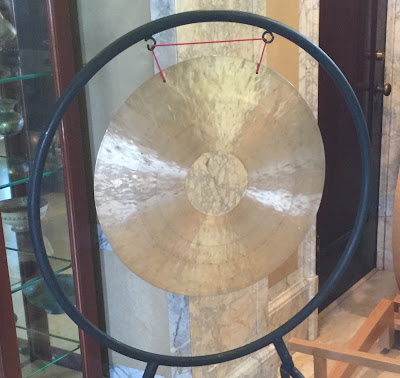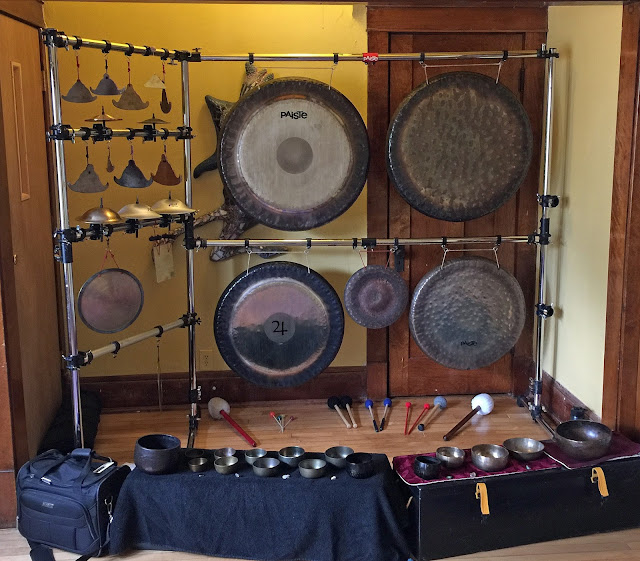Cracking/Breaking Gongs
This comes from a Facebook percussion group I'm in. Apparently it was either an outdoor marching band or drum corps show:
Without actually having been there, or seeing the Gong in person (apparently it was a Chinese Chou Gong), I can only speculate on this, but my first impression is that the kid overplayed the Gong by hitting it way too hard. Playing outdoors is difficult, because the sound dissipates quickly. There are no walls or ceilings to create reflections and contain the sound. Outside, you play something, and it often disappears into the air.
Competitive marching bands and drum corps go through a lot of percussion gear. You should see their instruments at the end of the season! Mallet instruments are often in the worst shape because they were never designed to produce the type of volume that a modern band or corps needs on the field. With drums, you can replace the heads. With everything else, you strike the actual instrument. Yes, you can replace individual bars on mallet instruments, but that's a real hassle.
But back to the Gong. I would suspect this Gong was the victim of both adrenalin, from the excitement of the show, and just hitting the Gong as hard as possible in order to get the most volume possible. The trouble with this, and all other percussion instruments, is that they each have a finite volume level they can produce. Once you reach that level, hitting them any harder will not make them any louder. The only thing you get from hitting harder is damage to the instrument. Competitive groups budget for instrument turnover because they know instruments will get played out during the season.
It was also stated that the Gong likely cracked “because he didn’t warm it up.” Well, I disagree with that. Even warming up a Gong (tapping it lightly to get it moving before you strike it) would not have helped in the face of over playing it. When you strike something as hard as you can, often something has to give. This could be the mallet, or in this case, the Gong. Another possibility is that the Gong had a weak spot, or defect, that lead to it cracking. Still, I would say that under normal playing circumstances, it still should not have cracked.
So What Is The Answer?
There really is no answer here. In competitive outdoor field performances, you need to get the most volume you can. With percussion instruments, this often comes by striking them as hard as you can, or close to it. Something has to give and it most likely will be your gear. The only answer is to have a big budget and/or instrument sponsorship, so you can replace all the broken instruments from each season.
The Next Question: Can You Fix A Cracked Gong?
The blunt answer is, no! But let's look at this further. Gongs are made out of tempered bronze. Tempering uses heat and cooling to harden the metal. If you try to weld the crack, you will actually change the temper and usually make the welded area weaker and susceptible to further cracking or breakage.
With a crack, it is possible to drill a hole beyond the visible end of each side, because there are usually micro cracks you can't see, to help keep the crack from spreading. If the crack buzzes, you can file it away so that no metal is touching on each side. This can help extend the useful life of your Gong. But a lot depends on how it is played. In the case up above, if the same Gong is continually struck too hard, it will most likely keep cracking or even have pieces break off. And even if you temporarily stop the crack, the sound of the Gong may change enough to become unusable.
Another possibility is to cut out a large piece of the Gong that contains the crack. This will change the sound of it quite a bit, but again, may extend the useful life of it until you can buy a new one.
I have a 22" Wind Gong that someone cracked the center of, and tried to repair by welding it. That only weakened it, causing pieces to break off of it. It was given to me with a large chunk missing in the center. I used a Dremel tool to cut out a large hole in the center, removing all of the damaged area. The sound is much different and rather hollow sounding, compared to one that is not broken. I use this Gong mostly for bowing it through the center hole. For this purpose it works extremely well.
What About Mallet Choice?
The type of mallet used can have an impact (pun intended) on how a Gong become damaged. Too small or hard a mallet for the size of Gong can stress the metal. I've seen a lot of people using the wrong mallet for the type of sound they want out of a Gong.
There is nothing better sounding than a well aged Paiste Gong from the 1960s or 70s. But a lot of these older Gongs are in bad shape. Paiste uses a thinner nickel-silver alloy than a bronze Chinese Chau Gong. Many of these older Paiste Gongs that are owned by high schools and universities have been abused or played out over the years. Often the center is dented/damaged, or the sound has just become dull and lifeless. Once this happens, there's really nothing you can do.
Prevention Is The Best Cure
Taking care of your instruments and playing them correctly is the best way to keep them lasting and sounding good. Also, don't let friends or other people play your Gongs, because they often hit them as hard as they can, thinking that it's funny. The result can be a broken Gong and a large expense to replace it.
~ MB
“Kid cracked a gong on the first hit of our show Saturday because he didn’t warm it up. Of course. It’s a decent sized crack, and we don’t have $1000 laying around to buy a new one. Is there any easy way to fix it? It's a Zildjian gong, idk how big, I'm going to GUESS 40"? It's cracked right at the edge of the gold ring and the outer ring, and it's about 4 inches long. The mallet we're using is not that hard and should not have done that kind of damage.”
Without actually having been there, or seeing the Gong in person (apparently it was a Chinese Chou Gong), I can only speculate on this, but my first impression is that the kid overplayed the Gong by hitting it way too hard. Playing outdoors is difficult, because the sound dissipates quickly. There are no walls or ceilings to create reflections and contain the sound. Outside, you play something, and it often disappears into the air.
Competitive marching bands and drum corps go through a lot of percussion gear. You should see their instruments at the end of the season! Mallet instruments are often in the worst shape because they were never designed to produce the type of volume that a modern band or corps needs on the field. With drums, you can replace the heads. With everything else, you strike the actual instrument. Yes, you can replace individual bars on mallet instruments, but that's a real hassle.
But back to the Gong. I would suspect this Gong was the victim of both adrenalin, from the excitement of the show, and just hitting the Gong as hard as possible in order to get the most volume possible. The trouble with this, and all other percussion instruments, is that they each have a finite volume level they can produce. Once you reach that level, hitting them any harder will not make them any louder. The only thing you get from hitting harder is damage to the instrument. Competitive groups budget for instrument turnover because they know instruments will get played out during the season.
It was also stated that the Gong likely cracked “because he didn’t warm it up.” Well, I disagree with that. Even warming up a Gong (tapping it lightly to get it moving before you strike it) would not have helped in the face of over playing it. When you strike something as hard as you can, often something has to give. This could be the mallet, or in this case, the Gong. Another possibility is that the Gong had a weak spot, or defect, that lead to it cracking. Still, I would say that under normal playing circumstances, it still should not have cracked.
So What Is The Answer?
There really is no answer here. In competitive outdoor field performances, you need to get the most volume you can. With percussion instruments, this often comes by striking them as hard as you can, or close to it. Something has to give and it most likely will be your gear. The only answer is to have a big budget and/or instrument sponsorship, so you can replace all the broken instruments from each season.
The Next Question: Can You Fix A Cracked Gong?
The blunt answer is, no! But let's look at this further. Gongs are made out of tempered bronze. Tempering uses heat and cooling to harden the metal. If you try to weld the crack, you will actually change the temper and usually make the welded area weaker and susceptible to further cracking or breakage.
With a crack, it is possible to drill a hole beyond the visible end of each side, because there are usually micro cracks you can't see, to help keep the crack from spreading. If the crack buzzes, you can file it away so that no metal is touching on each side. This can help extend the useful life of your Gong. But a lot depends on how it is played. In the case up above, if the same Gong is continually struck too hard, it will most likely keep cracking or even have pieces break off. And even if you temporarily stop the crack, the sound of the Gong may change enough to become unusable.
Care has to be taken with a broken Gong, as the metal is weakened and it may eventually shatter, causing injury to the player.
Another possibility is to cut out a large piece of the Gong that contains the crack. This will change the sound of it quite a bit, but again, may extend the useful life of it until you can buy a new one.
22" Bowing Gong with center hole.
I have a 22" Wind Gong that someone cracked the center of, and tried to repair by welding it. That only weakened it, causing pieces to break off of it. It was given to me with a large chunk missing in the center. I used a Dremel tool to cut out a large hole in the center, removing all of the damaged area. The sound is much different and rather hollow sounding, compared to one that is not broken. I use this Gong mostly for bowing it through the center hole. For this purpose it works extremely well.
What About Mallet Choice?
The type of mallet used can have an impact (pun intended) on how a Gong become damaged. Too small or hard a mallet for the size of Gong can stress the metal. I've seen a lot of people using the wrong mallet for the type of sound they want out of a Gong.
If you need a big sound from a big Gong, you need a big mallet.
Prevention Is The Best Cure
Taking care of your instruments and playing them correctly is the best way to keep them lasting and sounding good. Also, don't let friends or other people play your Gongs, because they often hit them as hard as they can, thinking that it's funny. The result can be a broken Gong and a large expense to replace it.
~ MB
Chop Wood / Carry Water / Play Gongs™




Comments
Post a Comment